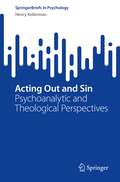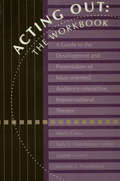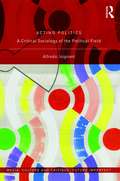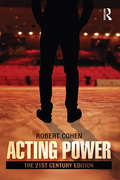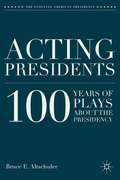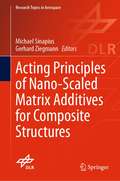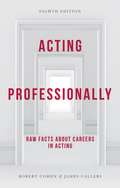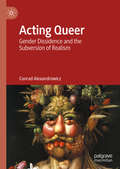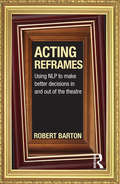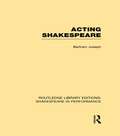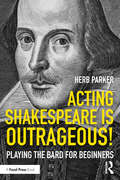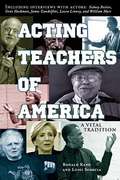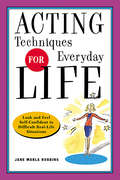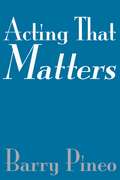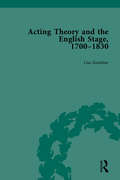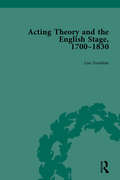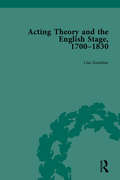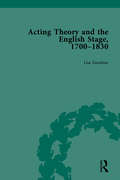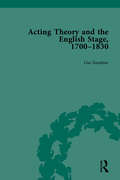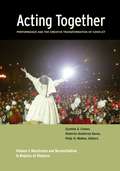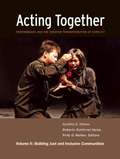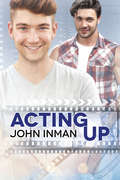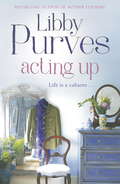- Table View
- List View
Acting Out and Sin: Psychoanalytic and Theological Perspectives (SpringerBriefs in Psychology)
by Henry KellermanThis brief treatise explores the common threads to psychoanalytic thought and theological theory. It uses a psychoanalytic lens to examine Judeo/Christian concepts of individual will, consciousness and the unconscious, and the apparent confounding idea of sin. What is new is that the definition of sin is revealed as a psychoanalytic translation of acting-out. Focusing on the behavior of acting-out it illuminates ideas that are part of Western cultural tradition providing insights to those interested in the psychology, and its history and philosophy. As such, it is a highly relevant work for psychologists, psychiatrists, and psychoanalysts, as well as for a comparative study of psychoanalytic and theological intersecting structures.
Acting Out: A Guide To The Development And Presentation Of Issue-Oriented, Audience- interactive, improvisational theatre
by Jennifer Russell Mario Cossa Sally Ember Lauren GlassThis handbook offers a compilation of background information, techniques and scenarios based on the Acting Out programme that offers theatre skills/counselling for groups of adolescents, free of charge. AO teens become performers, creating issues-oriented, audience-interactive, improvizational scenes with a variety of audiences.; Written for leaders who are familiar with improvizational theatre and working with groups, Part 1 discusses the importance of leader training, experience and intention. Psychodrama, sociodrama and theatre scenework are explained in some detail, with references offered for those who wish to learn more about these areas before proceeding. Information about group selection criteria, procedures and techniques for using the scenarios complete this section.; Part Two offers a set of eight topics each with its own list of scenarios. Each scenario begins with information about characters, settings and situations, and offerrs acting notes as well as age- appropriaeteness. A list of resources appears at the beginning of each thematic set of scenarios.
Acting Politics: A Critical Sociology of the Political Field (Media, Culture and Critique: Future Imperfect)
by Alfredo JoignantFollowing Bourdieu, this book seeks ‘to think about politics without thinking politically’, advancing the view that politics as conventionally understood does not take place in a social vacuum, but in the context of a certain topography of society that cannot be reduced to formal spaces (such as a parliament). Engaging with Bourdieu’s theory of fields and focusing specifically on the notion of the ‘political field’, the author analyses from a sociological perspective the functioning of the political field, seeing it not simply as a formal space, but as encompassing a sphere that is increasingly autonomous from others and driven by reasons and motives beyond those conventionally recognised as political. Illustrated with cases from the real political life of different countries, Acting Politics examines the nature of the practices of the agents who inhabit the political field, building a picture of a type of competitive political activity that is fundamentally social and symbolic. A sociological reading of the agents, struggles and forms of the contemporary political field, this book thinks with and against Bourdieu in a broad dialogue with different sociological currents and debates in other disciplines. As such, it will appeal to scholars of politics and sociology with interests in social and political theory and political sociology.
Acting Power: The 21st Century Edition
by Robert Cohen‘Robert Cohen’s book, Acting Power, follows the tradition of his other book, Acting One, and has been the veritable bible for acting teachers for the last quarter century.’ – David Krasner, Emerson College ‘This book, above all else, is an attempt to explore the qualities of acting power.... to suggest to you, the actor, an approach toward not merely good acting but powerful acting. Great actors display the power to frighten – and the power to seduce – and can shift between the one and the other like a violinist can her notes.’ – From the Preface The first edition of Acting Power was a groundbreaking work of acting theory which applied sociological and psychological principles to actor training. The book went on to influence a generation of theatre and performance studies students and academics, and was translated into five languages. This carefully revised 21st Century Edition (re)considers, in the context of today’s field: questions such as ‘should actors act from the inside or the outside?’ and ‘should the actor live the role or present the role?’; contemporary research into communication theory, cybernetics, and cognitive science; brilliantly illuminating and witty exercises for solo study and classroom use, and a through-line of useful references to classic plays; penetrating observations about the actor’s art by more than 75 distinguished professional actors and directors. Cohen’s elegant and rigorous updates emphasise the continuing relevance of his uniquely integrated and life-affirming approach to this field. The new edition draws on his extraordinarily rich career as teacher, scholar, director, translator and dramaturg. It is a recipe for thrilling theatre in any genre.
Acting Presidents
by Bruce E. AltschulerThis book seeks to fill a major gap in the literature about fictional representations of presidents by studying more than 40 plays, written since 1900, which have had prominent productions on or off-Broadway or in another major city.
Acting Principles of Nano-Scaled Matrix Additives for Composite Structures (Research Topics in Aerospace)
by Michael Sinapius Gerhard ZiegmannThe book explores the effect of nanoscale matrix additives along the four levels of material formation, particle-resin interaction, the influence of nanoparticles on the processability of the polymer, the influence of nanoparticles on polymer curing and the influence of nanoparticles on the fiber plastic composite. Fiber-reinforced plastics have a significantly higher lightweight construction potential in components with a primary single- or biaxial stress state compared to isotropic metals. At the same time, their insensitivity to corrosion and their advantageous fatigue properties can help to reduce maintenance costs. Due to their outstanding specific mechanical properties, they are among today's high-performance lightweight construction materials. These properties make them particularly attractive in the field of mobility. However, as soon as the matrix properties dominate the mechanical properties, e.g. in the case of fibre-parallel compressive strength, significant weaknesses become apparent in the mechanical properties. Here, one approach is to significantly increase the matrix properties through nanoscale ceramic additives and at the same time to guarantee the processability of the resin.
Acting Professionally (8th Edition)
by Robert Cohen James CalleriThis vital resource will steer you through the hugely competitive industry of stage, film and TV acting, offering wise advice on everything from writing an eye-catching résumé to finding an agent. It will give you a clear understanding of how acting careers are built and sustained, and how actors must position themselves in an environment overseen by directors, agents, casting directors and acting unions. Praised for its honest and critical understanding of the industry, the text has retained its status as the leading book in its field since the first edition published in 1972. Acclaimed industry professional authors Robert Cohen and James Calleri offer vast insight and experience as professors, directors, playwrights and casting directors, making the text essential reading for all students and lecturers of Acting at universities, drama schools and conservatories, as well as anyone interested in pursuing and developing their career in acting.
Acting Queer: Gender Dissidence and the Subversion of Realism
by Conrad AlexandrowiczThis book is situated at the intersection of queer/gender studies and theories of acting pedagogy and performance. It explores the social and cultural matrix in which matters of gender are negotiated, including that of post-secondary theatre and drama education. It identifies the predicament of gender dissident actors who must contend with the widespread enforcement of realist paradigms within the academy, and proposes a re-imagining of the way drama/theatre/performance are practised in order to serve more fairly and effectively the needs of queer actors in training. This is located within a larger project of critique in reference to the art form as a whole. The book stimulates discussion among practitioners and scholars on matters concerning various kinds of diversity: of gender expression, of approaches to the teaching of acting, and to the way the art form may be imagined and executed in the early years of the 21st Century, in particular in the face of the climate crisis. But it is also an aid to practitioners who are seeking new theoretical and practical approaches to dealing with gender diversity in acting pedagogy.
Acting Reframes: Using NLP to Make Better Decisions In and Out of the Theatre
by Robert BartonActing Reframes presents theatre and film practitioners with a methodology for using Neuro-Linguistic Programming (NLP) as a tool to aid their practice. Author Robert Barton uses the NLP approach to illustrate a range of innovative methods to help actors and directors, including: • reducing performance anxiety • enabling clearer communication • intensifying character analysis • stimulating imaginative rehearsal choices. The author also shows how NLP can used alongside other basic training systems to improve approaches to rehearsal and performance. The book shows the use of NLP to the reader in a playful, creative and easily accessible style that is structured to enable solo study as well as group work. The text offers a range of engaging exercises and extensive analysis of language patterns used in performance. It is a source for enhancing communication between all theatre practitioners in training, productions, and daily life outside the theatre. Acting Reframes gives actors a richly rewarding approach to help them develop all aspects of their craft.
Acting Shakespeare (Routledge Library Editions: Shakespeare in Performance)
by Bertram Leon JosephHow did the actors for whom Shakespeare wrote his plays make his characters come to life, how did they convey his words? Can modern directors, actors, and even library readers of Shakespeare learn from them? Creating character and making the Elizabethan playwright’s poetry compelling for the audience is a problem which has seldom been resolved in modern times. This book demonstrates the hard course a modern actor must follow to make real and truthful the words he speaks, and the action and emotion underlying them. With examples and simple exercises, this book helps with the preparation for the great task – providing the actor with a combination that unlocks the Bard's English. Starting with how theatrical speech was understood in Renaissance England, it looks at figures of speech, the powers of persuasion, and the passion and rhythm inherent in the language.
Acting Shakespeare is Outrageous!: Playing the Bard for Beginners
by Herb ParkerPerforming the work of William Shakespeare can be daunting to new actors. Author Herb Parker posits that his work is played easier if actors think of the plays as happening out of outrageous situations, and remember just how non-realistic and presentational Shakespeare's plays were meant to be performed. The plays are driven by language and the spoken word, and the themes and plots are absolutely out of the ordinary and fantastic - the very definition of outrageous. With exercises, improvisations, and coaching points, Acting Shakespeare is Outrageous! helps actors use the words Shakespeare wrote as a tool to perform him, and to create exciting and moving performances.
Acting Teachers of America: A Vital Tradition
by Ronald RandFifty of America's most influential acting teachers (including directors and actors who also teach) explain their philosophy and techniques. Each teacher interview is immediately followed by another with a former or current student describing his or her impact.
Acting Techniques for Everyday Life: Look and Feel Self-Confident in Difficult, Real-Life Situations
by Jane Marla RobbinsMost people can name at least one situation?a business presentation, a job interview, a cocktail party, or a blind date?in which they felt uncomfortable, nervous, or simply self-conscious. Jane Marla Robbins, a successful stage and film actress and teacher for almost forty years, found that she could use the same acting techniques she employed to look and feel confident on stage and screen to make herself feel more comfortable in ?real-lifeOCO situations. In clear and accessible language, Robbins describes acting techniques that actors having been using for centuries and explains?using real-life examples and easy-to-follow exercises?how each can be used by ordinary people to make difficult everyday situations easier to handle. Acting Techniques for Everyday Life will teach readers how to create a sense of well-being and self-confidence at will, giving them the tools they need to be as confident, strong, witty, authentic, relaxed, and happy as they want to be in any given situation. "
Acting That Matters
by Barry PineoAn invaluable resource for anyone wanting his or her acting to matter, this groundbreaking guide defies most modern acting methods by rejecting emotion as an acting tool. With the advice in this book, actors will see beyond the prevailing "objective-obstacle" approach and look primarily to the text the playwright provides. Actors learn how to dissect a text for key words and phrases, as well as how to score a script, find proper tempo and rhythm, modulate volume and intensity, use theatrical stillness effectively, find beat actions, listen to their acting partners, and much more. Expert tips are also provided for auditioning, cold reading, and taking direction.
Acting Theory and the English Stage, 1700-1830 Volume 1
by Lisa ZunshineDuring the eighteenth century, treatises on the science of elocution, gesture and naturalness abounded. This title draws together a representative selection of the most difficult-to-access texts in the period. It helps cultural historians to examine the place of stagecraft in the eighteenth-century imagination.
Acting Theory and the English Stage, 1700-1830 Volume 2
by Lisa ZunshineDuring the eighteenth century, treatises on the science of elocution, gesture and naturalness abounded. This title draws together a representative selection of the most difficult-to-access texts in the period. It helps cultural historians to examine the place of stagecraft in the eighteenth-century imagination.
Acting Theory and the English Stage, 1700-1830 Volume 3
by Lisa ZunshineDuring the eighteenth century, treatises on the science of elocution, gesture and naturalness abounded. This title draws together a representative selection of the most difficult-to-access texts in the period. It helps cultural historians to examine the place of stagecraft in the eighteenth-century imagination.
Acting Theory and the English Stage, 1700-1830 Volume 4
by Lisa ZunshineDuring the eighteenth century, treatises on the science of elocution, gesture and naturalness abounded. This title draws together a representative selection of the most difficult-to-access texts in the period. It helps cultural historians to examine the place of stagecraft in the eighteenth-century imagination.
Acting Theory and the English Stage, 1700-1830 Volume 5
by Lisa ZunshineDuring the eighteenth century, treatises on the science of elocution, gesture and naturalness abounded. This title draws together a representative selection of the most difficult-to-access texts in the period. It helps cultural historians to examine the place of stagecraft in the eighteenth-century imagination.
Acting Together I: Resistance and Reconciliation in Regions of Violence
by Edited by Cynthia E. Cohen, Roberto Gutiérrez Varea, and Polly O. WalkerCourageous artists working in conflict regions describe exemplary peacebuilding performances and groundbreaking theory on performance for transformation of violence.Acting Together: Performance and the Creative Transformation of Conflict is a two-volume work describing peacebuilding performances in regions beset by violence and internal conflicts. Volume I: Resistance and Reconciliation in Regions of Violence, emphasizes the role theatre and ritual play both in the midst and in the aftermath of direct violence, while Volume II: Building Just and Inclusive Communities, focuses on the transformative power of performance in regions fractured by "subtler" forms of structural violence and social exclusion.Volume I: Resistance and Reconciliation in Regions of Violence focuses on the role theatre and ritual play both in the midst and in the aftermath of violence. The performances highlighted in this volume nourish and restore capacities for expression, communication, and transformative action, and creatively support communities in grappling with conflicting moral imperatives surrounding questions of justice, memory, resistance, and identity. The individual chapters, written by scholars, conflict resolution practitioners, and artists who work directly with the communities involved, offer vivid firsthand accounts and analyses of traditional and nontraditional performances in Serbia, Uganda, Sri Lanka, Palestine, Israel, Argentina, Peru, India, Cambodia, Australia, and the United States.Complemented by a website of related materials, a documentary film, Acting Together on the World Stage, that features clips and interviews with the curators and artists, and a toolkit, or "Tools for Continuing the Conversation," that is included with the documentary as a second disc, this book will inform and inspire socially engaged artists, cultural workers, peacebuilding scholars and practitioners, human rights activists, students of peace and justice studies, and whoever wishes to better understand conflict and the power of art to bring about social change.The Acting Together project is born of a collaboration between Theatre Without Borders and the Program in Peacebuilding and the Arts at the International Center for Ethics, Justice, and Public Life at Brandeis University. The two volumes are edited by Cynthia E. Cohen, director of the aforementioned program and a leading figure in creative approaches to coexistence and reconciliation; Roberto Gutierrez Varea, an award-winning director and associate professor at the University of San Francisco; and Polly O. Walker, director of Partners in Peace, an NGO based in Brisbane, Australia..
Acting Together II: Building Just and Inclusive Communities
by Edited by Cynthia E. Cohen, Roberto Gutiérrez Varea and Polly O. WalkerActing Together, Volume ll, continues from where the first volume ends documenting exemplary peacebuilding performances in regions marked by social exclusion structural violence and dislocation. Acting Together: Performance and the Creative Transformation of Conflict is a two-volume work describing peacebuilding performances in regions beset by violence and internal conflicts. Volume I, Resistance and Reconciliation in Regions of Violence, emphasizes the role theatre and ritual play both in the midst and in the aftermath of direct violence, while Volume II: Building Just and Inclusive Communities, focuses on the transformative power of performance in regions fractured by "subtler" forms of structural violence and social exclusion.Volume I: Resistance and Reconciliation in Regions of Violence focuses on the role theatre and ritual play both in the midst and in the aftermath of violence. The performances highlighted in this volume nourish and restore capacities for expression, communication, and transformative action, and creatively support communities in grappling with conflicting moral imperatives surrounding questions of justice, memory, resistance, and identity. The individual chapters, written by scholars, conflict resolution practitioners, and artists who work directly with the communities involved, offer vivid firsthand accounts and analyses of traditional and nontraditional performances in Serbia, Uganda, Sri Lanka, Palestine, Israel, Argentina, Peru, India, Cambodia, Australia, and the United States.Complemented by a website of related materials, a documentary film, Acting Together on the World Stage, that features clips and interviews with the curators and artists, and a toolkit, or "Tools for Continuing the Conversation," that is included with the documentary as a second disc, this book will inform and inspire socially engaged artists, cultural workers, peacebuilding scholars and practitioners, human rights activists, students of peace and justice studies, and whoever wishes to better understand conflict and the power of art to bring about social change.The Acting Together project is born of a collaboration between Theatre Without Borders and the Program in Peacebuilding and the Arts at the International Center for Ethics, Justice, and Public Life at Brandeis University. The two volumes are edited by Cynthia E. Cohen, director of the aforementioned program and a leading figure in creative approaches to coexistence and reconciliation; Roberto Gutierrez Varea, an award-winning director and associate professor at the University of San Francisco; and Polly O. Walker, director of Partners in Peace, an NGO based in Brisbane, Australia.
Acting Unilaterally: Bringing Balance to Difficult Conversations
by Holly WeeksMost people think that trust and mutual respect are the two necessary ingredients for good results in difficult conversations. Unfortunately, in hard or even toxic talks, one side often does not bring trust or respect to the conversation. If we put our attention on working toward balance, and bringing self-respect and respect for our counterpart to the conversation, we can unilaterally alter the track of the conversation and increase neutrality.
Acting Up
by John InmanIt’s not easy breaking into show biz. Especially when you aren’t exactly loaded with talent. But Malcolm Fox won’t let a little thing like that hold him back. Actually, it isn’t the show-business part of his life that bothers him as much as the romantic part—or the lack thereof. At twenty-six, Malcolm has never been in love. He lives in San Diego with his roommate, Beth, another struggling actor, and each of them is just as unsuccessful as the other. While Malcolm toddles off to this audition and that, he ponders the lack of excitement in his life. The lack of purpose. The lack of a man. Then Beth’s brother moves in. Freshly imported from Missouri of all places, Cory Williams is a towering hunk of muscles and innocence, and Malcolm is gobsmacked by the sexiness of his new roomie from the start. When infatuation enters the picture, Malcolm knows he’s really in trouble. After all, Cory is straight! At least, that’s the general consensus.
Acting Up
by Libby PurvesThe Andersons are a military family with honours and traditions stretching back two hundred years. When the second Iraq war breaks out, it is only natural that their newest generations should be represented in the ranks of British officers: at 24, Lieutenant Susie Anderson delays her wedding to handsome fellow-officer Callum and joins her regiment on the hot sands of Kuwait. Brother Francis, meanwhile, continues his cabaret career as Madam Fanny Fantoni, drag chanteuse and net-stockinged vamp, with a stinging line in repartee and the most remarkable falsetto top C in Clapham. As the neighbours agree, it must be terribly difficult for their poor parents, especially the General. Real difficulties come, though, when Callum comes home injured, altered and bitter, and Susie and her family feel as though their lives are shattered. The solution to this tangle comes from the most unlikely source of all.Set against a background of desert war, seedy clubs, a hippie sailing-ship and quiet English village life, Libby Purves' latest novel is a commentary on changing social roles, the nature of courage and the futility of prejudice.
Acting Up
by Libby PurvesThe Andersons are a military family with honours and traditions stretching back two hundred years. When the second Iraq war breaks out, it is only natural that their newest generations should be represented in the ranks of British officers: at 24, Lieutenant Susie Anderson delays her wedding to handsome fellow-officer Callum and joins her regiment on the hot sands of Kuwait. Brother Francis, meanwhile, continues his cabaret career as Madam Fanny Fantoni, drag chanteuse and net-stockinged vamp, with a stinging line in repartee and the most remarkable falsetto top C in Clapham. As the neighbours agree, it must be terribly difficult for their poor parents, especially the General. Real difficulties come, though, when Callum comes home injured, altered and bitter, and Susie and her family feel as though their lives are shattered. The solution to this tangle comes from the most unlikely source of all.Set against a background of desert war, seedy clubs, a hippie sailing-ship and quiet English village life, Libby Purves' latest novel is a commentary on changing social roles, the nature of courage and the futility of prejudice.
